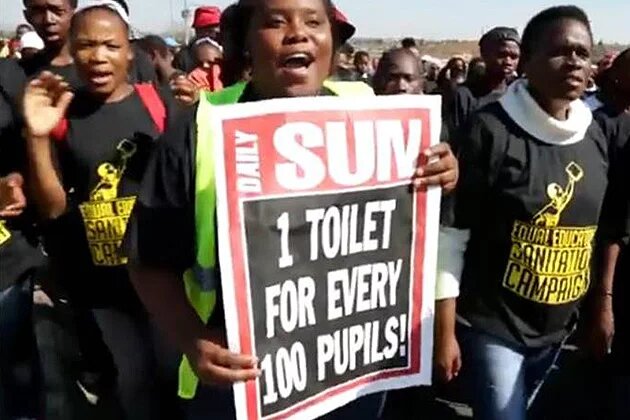
Fighting for Sanitation in South Africa's Schools: Social Audit for Social Justice - EqualEducation
 Watch on YouTube
Watch on YouTube
In March and April 2015, Equal Education led an effort including 10 community based organisations, 500 students, parents, teachers and grandparents belonging to the Gauteng Education Crisis Coalition in auditing the learning conditions of 200,000 students in over 200 schools in more than 20 communities in Gauteng – about 10% of the township schools in the province. This is one of the largest social audits in South Africa to date.
The audit found a sanitation crisis in schools. In 30% of the high schools audited, over 100 learners were sharing a single working toilet. 1 in 5 toilets were either broken or locked. About 70% of schools do not provide access to soap and 40% do not provide access to toilet paper or sanitary pads. Over 25% of schools have more than 400 students for 1 maintenance staff member. The audit also identified other issues like overcrowding, lack of access to sports fields, labs and libraries as well as the mass exclusion of students with disabilities. See a summary of results and the full report for further details on the findings.
On May 16 2015, Equal Education held the Gauteng Schools Social Audit Summit in Soweto to announce the results of the audit and make demands to address the problems identified. These included the following:
- Establish a Gauteng-appropriate standard/ratio for sanitation. The World Health Organisation sets a ratio of 50 males to one toilet plus one urinal and 25 females to one toilet.
- Set a quality standard for the ratio of maintenance staff per student. This is a recommendation that the GDE's own consultants have endorsed.
- Provide a model budget for schools to show how schools can afford soap, toilet paper, sanitary bins and other essentials. The GDE itself has acknowledged that the lack of toilet paper in schools forces students to use other materials which block toilets. Yet, principals say they don’t have the money to buy supplies. A model budget must show how schools can afford these supplies. It may show the need to increase funds to schools.
- Publicly begin blacklisting contractors who under-perform. The GDE's own consultants recommended doing this and MEC Lesufi has promised to do so.
- Fully fund the GDE's request of R350 million to maintain school toilets and ring-fence this money.
In response, MEC for Education in Gauteng, Mr Panyaza Lesufi, responded by stating that he “fully accepted [these] demands unconditionally.” He also made a series of other bold promises which included:
- By 20 July 2015, the beginning of the third school term, he will:
- Demolish the toilet blocks at the 50 worst schools in the province and build new ones. He promised to provide the list of the targeted schools to EE and challenged us to monitor to see if he kept his promise.
- Refurbish the toilets and classrooms used by matrics in all township schools. This includes fixing the ceilings, floors and curtains.
- Provide dignity packs to 21,000 girl learners on a monthly basis.
- Replace all chalkboards in all matric classrooms in Gauteng with smartboards.
- He said that from 1 May 2015, he gave all schools the power to manage their own budget (i.e. all schools are now Section 21 schools).
- By 1 June, a number of schools in suburbs and townships will be governed by a merged School Governing Body (SGB). He gave the examples of Sandton High and Alexandra High, Lyndhurst and Pimville. He said this will enable children from low-income families to have access to resources at wealthier schools.
Watch Gauteng MEC for education Panyaza Lesufi respond to the audit findings
See a full video of his comments as well as an abbreviated transcript of his remarks for further details on these promises. Equal Education will continue to monitor to ensure MEC Lesufi keeps his word.